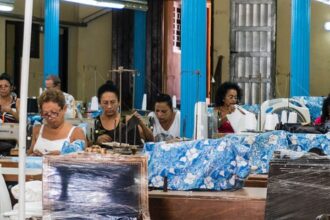LOOK OUT FOR NATURAL FIBRES – That’s a given! Look for organic cotton, hemp or bamboo. Tencel is also quite a popular choice, so if you find the names Lyocell or Modal around, know that it’s Tencel. While traditionally fitness wear has been made from non-biodegradable fabrics like nylon and polyester, Asquith uses bamboo and Bambor®, their trademarked performance fabric, which is a blend of bamboo, organic cotton and a small amount of Elasthane.
DON’T BE FOOLED BY RECYCLED SYNTHETICS – Many eco-friendly sports gear companies are doing an excellent job recycling plastic and using it to make new products, which is great as it gives that plastic a longer life but still, it’s plastic. When we wash these clothes they shed millions of tiny particles of plastic that are so small they drain out of the washing machine, through our water waste and ultimately into our oceans and into our food chain, sadly drastically harming the environment and the marine life that swallow this nonsensical waste.
CLEAN PRODUCTION – It’s not just about the materials, whether a brand manufactures it’s products without harming the environment is perhaps the essential factor that makes eco-friendly brands stand out. Green products are produced without using any harmful chemicals, and they either recycle all the waste or dispose it off responsibly.
ETHICAL PRACTICES – Sustainability also applies to humane practices. You can’t say a brand sustainable if they don’t provide fair wages and benefits for the workers and take practical steps to change this ugly side of the industry. We need to demand transparency – ethical companies are proud of the way they run things. You can read about Asquith practices here.







